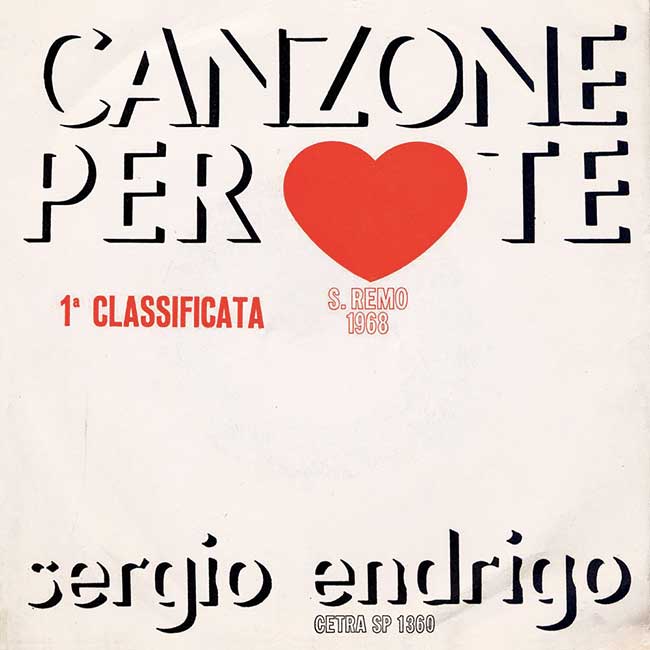Canzone per te

(Sergio Bardotti-Sergio Endrigo) – Sergio Endrigo, Roberto Carlos, 1968
Endrigo, a singer with an intimate style, had two ideal matches in mind for Canzone per te, both with great voices. One was Alain Barriere, the other Riccardo Del Turco, his brother-in-law. Instead, at first they proposed we try Astrud Gilberto, a great international star. We were honoured by it. However, after hearing the audition, we said in unison, “Over our dead bodies.” She looked like a dumbfounded Barbie doll. Her singing was absolutely expressionless and above all slightly out of tune. It was a tremendous disappointment. At that point, the secret record industry games (Fonit-Cetra and Messaggerie Musicali, which represented CBS in Italy) pressed Roberto Carlos on us. He wasn’t a bad singer, far from it. But he gave the feeling of being too similar to Endrigo, of “imitating” our version, in short. Sergio and I agreed to this very reluctantly.
One revealing episode of the subtle deception: Roberto had learned the song with the first version of the lyrics so the agreement had been made long back, without our knowledge. In the meantime, we had redone it, but nobody in Brazil had warned them that the lyrics had changed, so Roberto had recorded the disc with the first version. At the rehearsals, he actually sang half of the words differently from the official version. I don’t know if anyone still has in mind the image of the Brazilian singer with his head tilted and that fascinating melancholy air. He had written out the part of the text he didn’t know by heart and so he was reading it upside down. And everyone was saying, “How touching, how sad.” He was just reading. And this is how the myth of the melancholy Roberto Carlos was born.
It was thanks to this incident, the forced pairing of a Sanremo won by surprise, that I came to know a land I fell madly in love with and where I had life-changing encounters, both human and professional. My first time in Brazil was as a pianist for Endrigo for a tour with Roberto two months after the Festival. We realized what it meant over there that Roberto was “O rey”, the king. The Festival, I believe, had been the first international affirmation for Brazil (which had not yet won the third World Cup, nor had it yet sent the Formula One drivers on to the track).
An ongoing party, unforgettable gratitude, enthusiasm, everywhere. I met Pele (who gave me an autographed number 10 national team shirt). I met Jorge Ben and Chico Buarque de Hollanda, who was already a hero of mine. When we arrived at Porto Alegre, the reception at the airport was worthy of heads of state. Two crowded unbroken lines of people with the Brazilian and Italian flags accompanied the convertible limousines we rode in to the city and hotel. For the first and only time, I saw a photo of myself on the front page of a newspaper.
In the evening, the most exciting episode, when I thought: “I’ve found my people, I’ve found my land.” In the sports arena, there were twenty thousand people crowded together. I had to start the show by myself on the piano, with Canzone per te. They recognized it after the first few notes, all stood up and began to sing it, in Italian. Sergio and Roberto, when they came on stage together, turned the microphones towards the audience. They didn’t open their mouths, and the people continued to the end. Today, it happens every day, at concerts by our great artists. Back then it seemed like a miracle to me, the first miracle that San Brasile had performed for me.
Excerpted from: Bardotti, Sergio, In via dei matti numero zero, Rome, Edizioni Associate, 1997, pp. 55-57
